A Study on the Importance of Hospitality in Malta's Economic Growth
VerifiedAdded on 2023/04/17
|44
|12380
|246
Report
AI Summary
This report presents a comprehensive analysis of the hospitality industry's significance within Malta's economic framework. The study investigates the industry's impact on the nation's GDP and overall economic growth, examining factors such as tourism, hotel development, and governmental initiatives. The research employs a qualitative methodology, including interviews with hotel managers, to gather primary data and explore the relationship between the hospitality sector and Malta's economic development. The report reviews existing literature on economic growth and the hospitality industry, providing a foundation for understanding the industry's role in the nation's economy. The findings highlight the positive contributions of the hospitality industry to Malta's economy, including job creation and revenue generation. The study concludes with recommendations for enhancing the hospitality sector and its contribution to economic growth. The report also acknowledges limitations and suggests areas for future research, offering valuable insights into the complex relationship between the hospitality industry and national economic development.
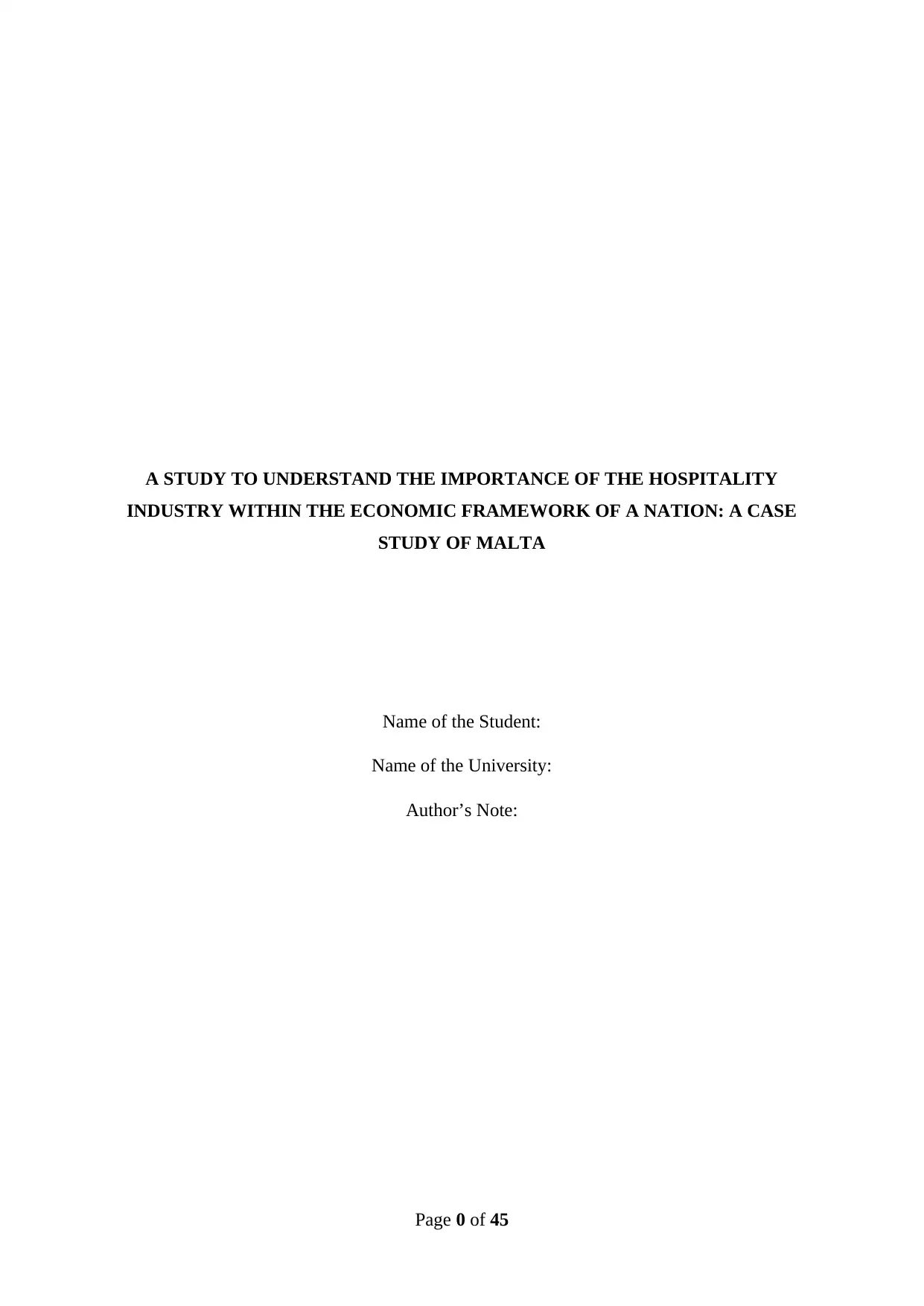
A STUDY TO UNDERSTAND THE IMPORTANCE OF THE HOSPITALITY
INDUSTRY WITHIN THE ECONOMIC FRAMEWORK OF A NATION: A CASE
STUDY OF MALTA
Name of the Student:
Name of the University:
Author’s Note:
Page 0 of 45
INDUSTRY WITHIN THE ECONOMIC FRAMEWORK OF A NATION: A CASE
STUDY OF MALTA
Name of the Student:
Name of the University:
Author’s Note:
Page 0 of 45
Paraphrase This Document
Need a fresh take? Get an instant paraphrase of this document with our AI Paraphraser
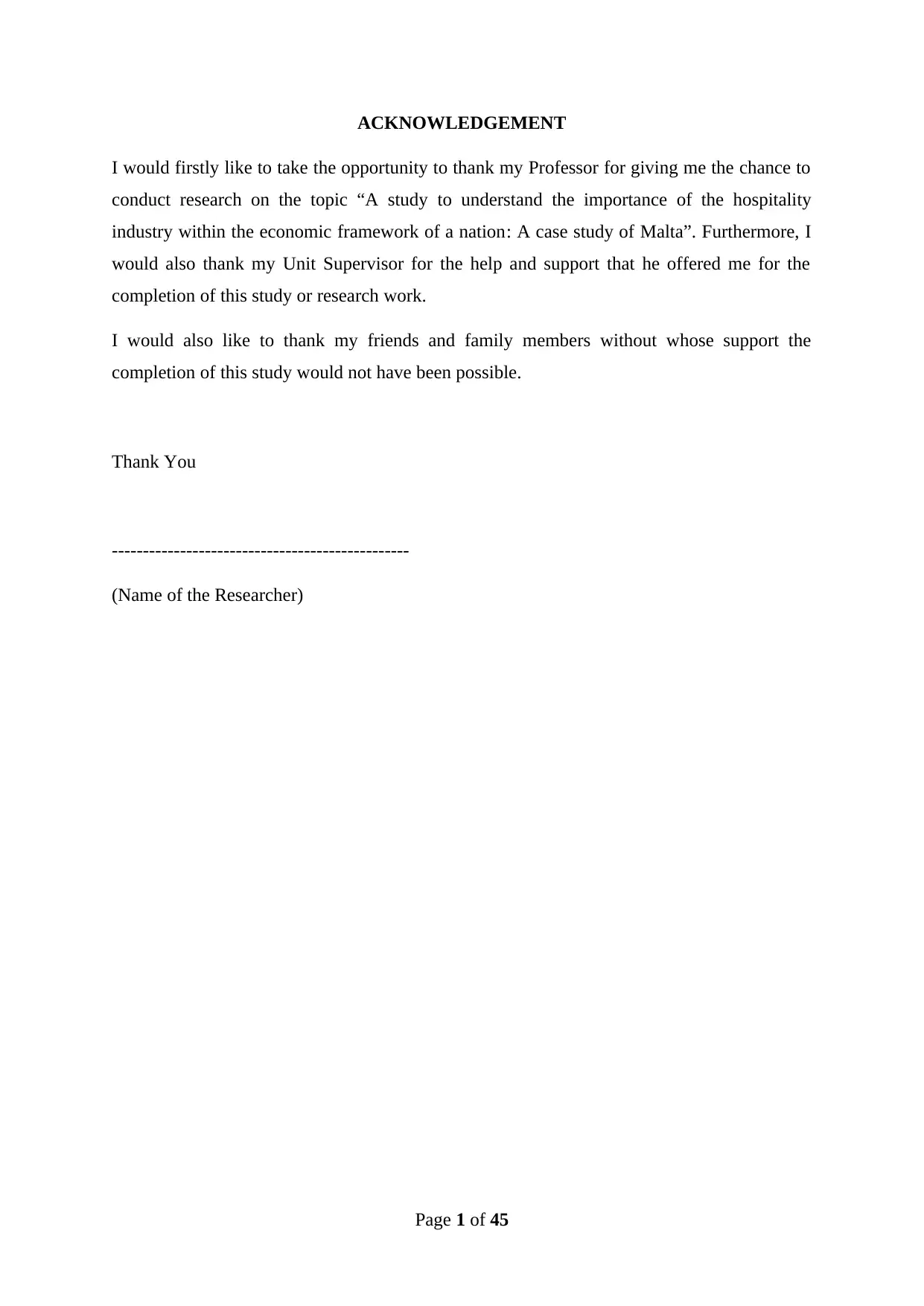
ACKNOWLEDGEMENT
I would firstly like to take the opportunity to thank my Professor for giving me the chance to
conduct research on the topic “A study to understand the importance of the hospitality
industry within the economic framework of a nation: A case study of Malta”. Furthermore, I
would also thank my Unit Supervisor for the help and support that he offered me for the
completion of this study or research work.
I would also like to thank my friends and family members without whose support the
completion of this study would not have been possible.
Thank You
------------------------------------------------
(Name of the Researcher)
Page 1 of 45
I would firstly like to take the opportunity to thank my Professor for giving me the chance to
conduct research on the topic “A study to understand the importance of the hospitality
industry within the economic framework of a nation: A case study of Malta”. Furthermore, I
would also thank my Unit Supervisor for the help and support that he offered me for the
completion of this study or research work.
I would also like to thank my friends and family members without whose support the
completion of this study would not have been possible.
Thank You
------------------------------------------------
(Name of the Researcher)
Page 1 of 45
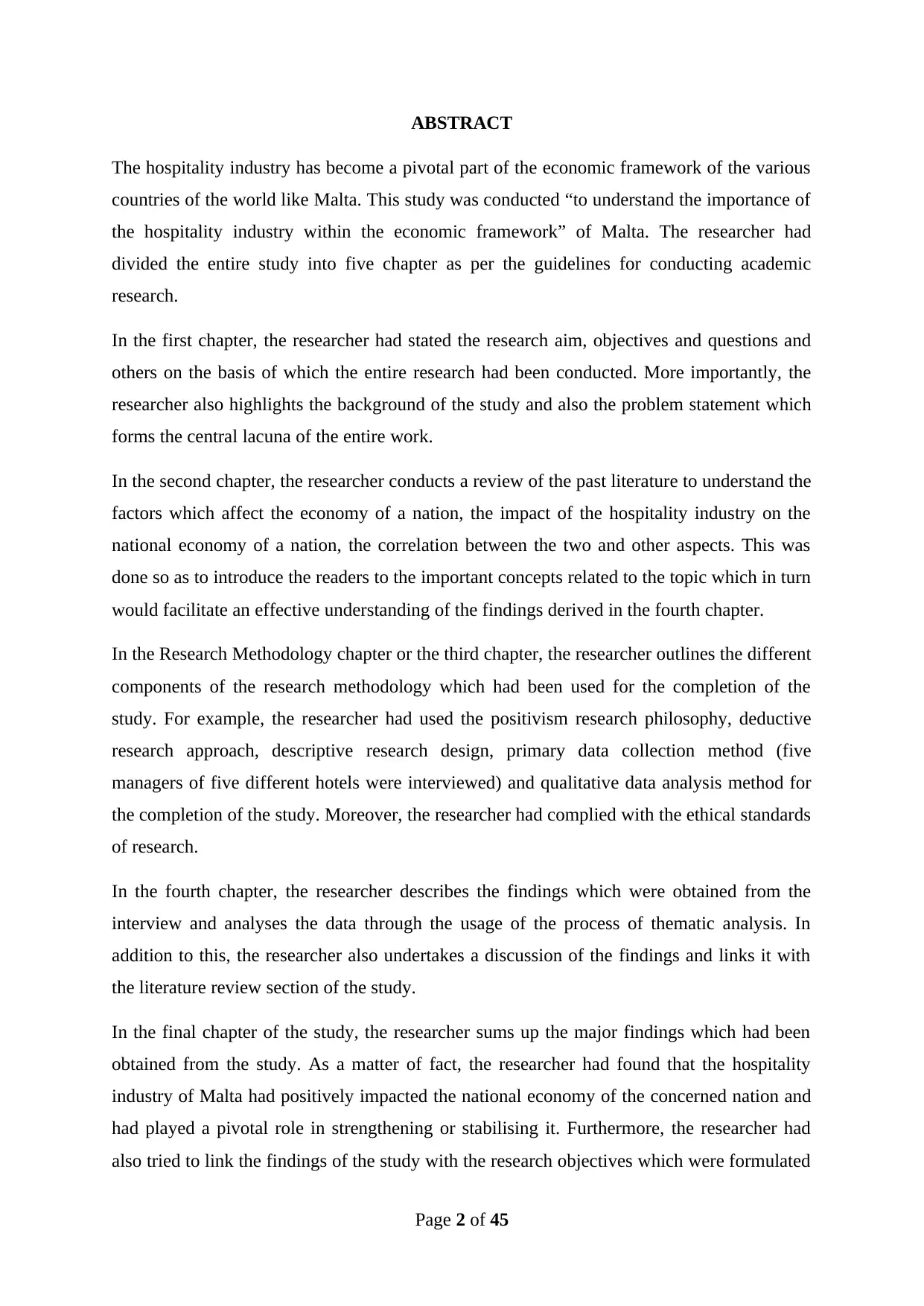
ABSTRACT
The hospitality industry has become a pivotal part of the economic framework of the various
countries of the world like Malta. This study was conducted “to understand the importance of
the hospitality industry within the economic framework” of Malta. The researcher had
divided the entire study into five chapter as per the guidelines for conducting academic
research.
In the first chapter, the researcher had stated the research aim, objectives and questions and
others on the basis of which the entire research had been conducted. More importantly, the
researcher also highlights the background of the study and also the problem statement which
forms the central lacuna of the entire work.
In the second chapter, the researcher conducts a review of the past literature to understand the
factors which affect the economy of a nation, the impact of the hospitality industry on the
national economy of a nation, the correlation between the two and other aspects. This was
done so as to introduce the readers to the important concepts related to the topic which in turn
would facilitate an effective understanding of the findings derived in the fourth chapter.
In the Research Methodology chapter or the third chapter, the researcher outlines the different
components of the research methodology which had been used for the completion of the
study. For example, the researcher had used the positivism research philosophy, deductive
research approach, descriptive research design, primary data collection method (five
managers of five different hotels were interviewed) and qualitative data analysis method for
the completion of the study. Moreover, the researcher had complied with the ethical standards
of research.
In the fourth chapter, the researcher describes the findings which were obtained from the
interview and analyses the data through the usage of the process of thematic analysis. In
addition to this, the researcher also undertakes a discussion of the findings and links it with
the literature review section of the study.
In the final chapter of the study, the researcher sums up the major findings which had been
obtained from the study. As a matter of fact, the researcher had found that the hospitality
industry of Malta had positively impacted the national economy of the concerned nation and
had played a pivotal role in strengthening or stabilising it. Furthermore, the researcher had
also tried to link the findings of the study with the research objectives which were formulated
Page 2 of 45
The hospitality industry has become a pivotal part of the economic framework of the various
countries of the world like Malta. This study was conducted “to understand the importance of
the hospitality industry within the economic framework” of Malta. The researcher had
divided the entire study into five chapter as per the guidelines for conducting academic
research.
In the first chapter, the researcher had stated the research aim, objectives and questions and
others on the basis of which the entire research had been conducted. More importantly, the
researcher also highlights the background of the study and also the problem statement which
forms the central lacuna of the entire work.
In the second chapter, the researcher conducts a review of the past literature to understand the
factors which affect the economy of a nation, the impact of the hospitality industry on the
national economy of a nation, the correlation between the two and other aspects. This was
done so as to introduce the readers to the important concepts related to the topic which in turn
would facilitate an effective understanding of the findings derived in the fourth chapter.
In the Research Methodology chapter or the third chapter, the researcher outlines the different
components of the research methodology which had been used for the completion of the
study. For example, the researcher had used the positivism research philosophy, deductive
research approach, descriptive research design, primary data collection method (five
managers of five different hotels were interviewed) and qualitative data analysis method for
the completion of the study. Moreover, the researcher had complied with the ethical standards
of research.
In the fourth chapter, the researcher describes the findings which were obtained from the
interview and analyses the data through the usage of the process of thematic analysis. In
addition to this, the researcher also undertakes a discussion of the findings and links it with
the literature review section of the study.
In the final chapter of the study, the researcher sums up the major findings which had been
obtained from the study. As a matter of fact, the researcher had found that the hospitality
industry of Malta had positively impacted the national economy of the concerned nation and
had played a pivotal role in strengthening or stabilising it. Furthermore, the researcher had
also tried to link the findings of the study with the research objectives which were formulated
Page 2 of 45
⊘ This is a preview!⊘
Do you want full access?
Subscribe today to unlock all pages.

Trusted by 1+ million students worldwide
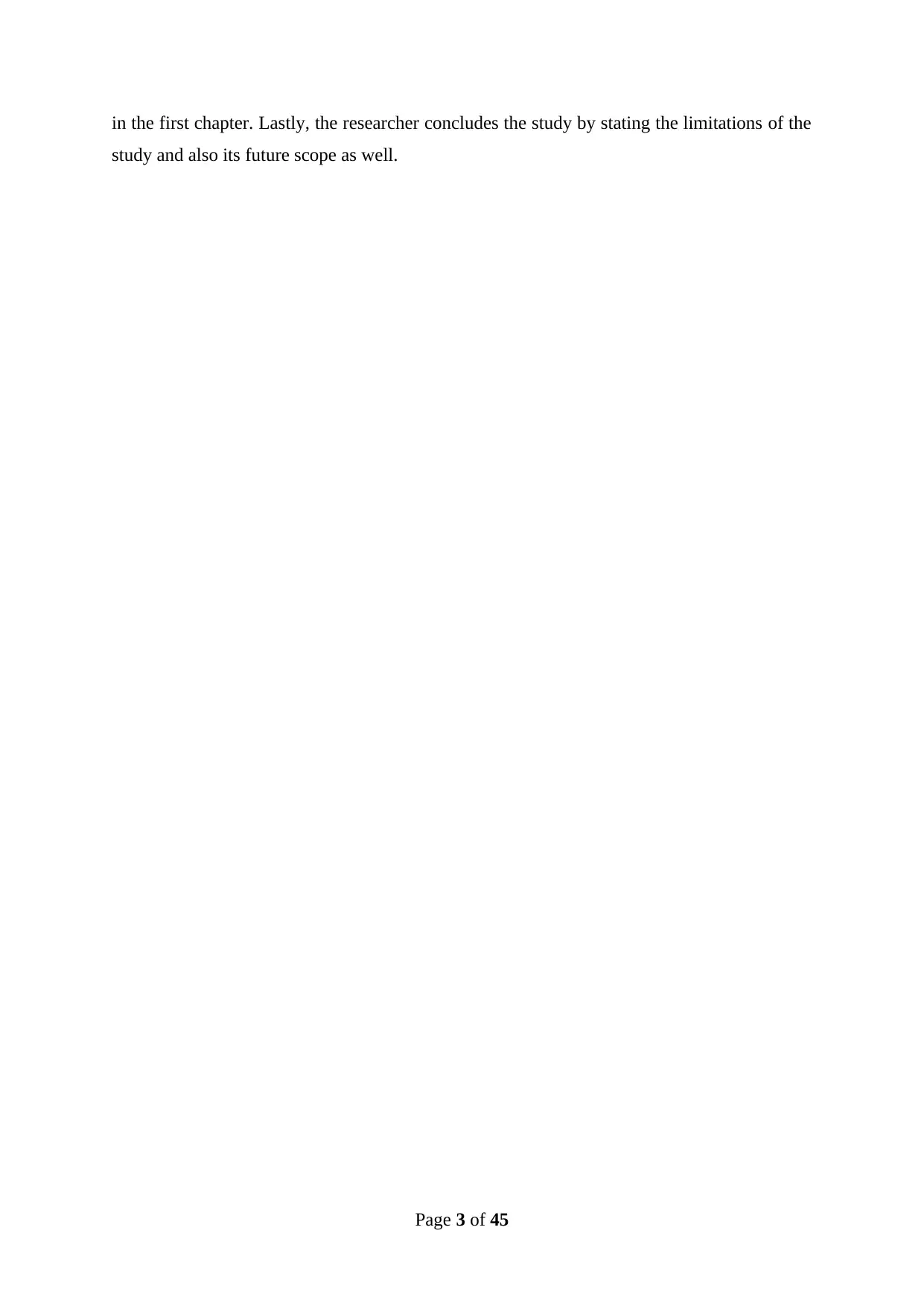
in the first chapter. Lastly, the researcher concludes the study by stating the limitations of the
study and also its future scope as well.
Page 3 of 45
study and also its future scope as well.
Page 3 of 45
Paraphrase This Document
Need a fresh take? Get an instant paraphrase of this document with our AI Paraphraser
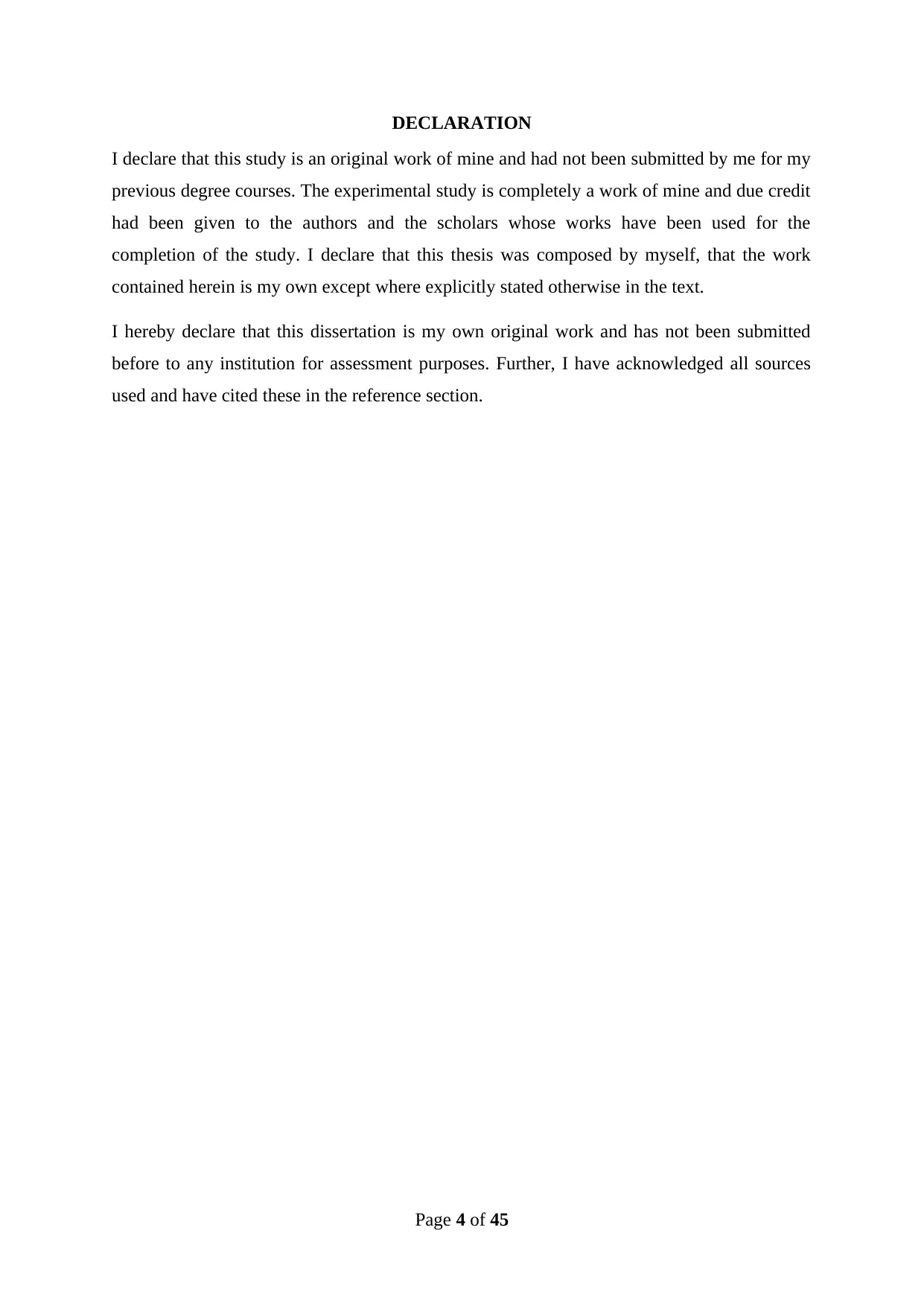
DECLARATION
I declare that this study is an original work of mine and had not been submitted by me for my
previous degree courses. The experimental study is completely a work of mine and due credit
had been given to the authors and the scholars whose works have been used for the
completion of the study. I declare that this thesis was composed by myself, that the work
contained herein is my own except where explicitly stated otherwise in the text.
I hereby declare that this dissertation is my own original work and has not been submitted
before to any institution for assessment purposes. Further, I have acknowledged all sources
used and have cited these in the reference section.
Page 4 of 45
I declare that this study is an original work of mine and had not been submitted by me for my
previous degree courses. The experimental study is completely a work of mine and due credit
had been given to the authors and the scholars whose works have been used for the
completion of the study. I declare that this thesis was composed by myself, that the work
contained herein is my own except where explicitly stated otherwise in the text.
I hereby declare that this dissertation is my own original work and has not been submitted
before to any institution for assessment purposes. Further, I have acknowledged all sources
used and have cited these in the reference section.
Page 4 of 45
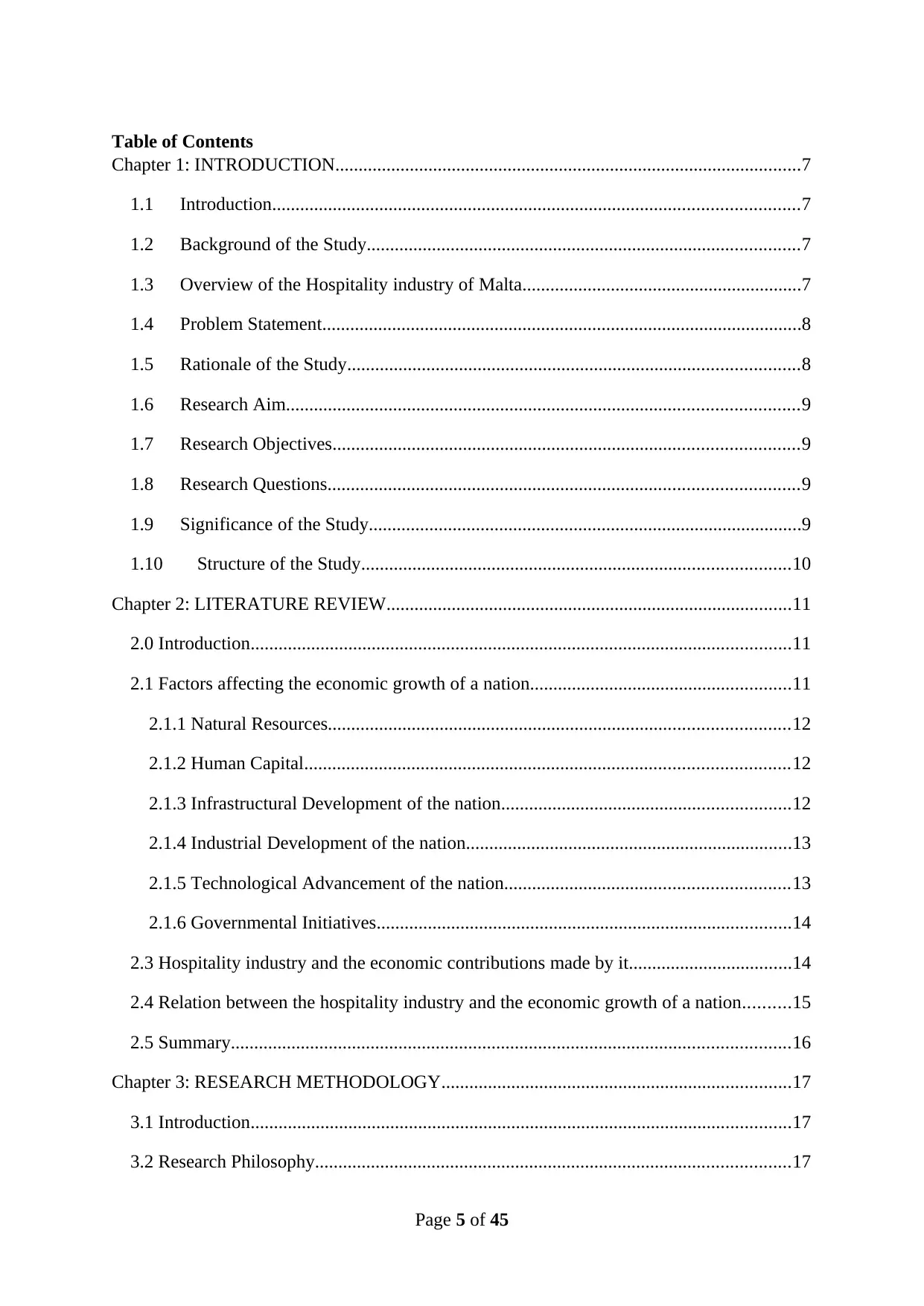
Table of Contents
Chapter 1: INTRODUCTION....................................................................................................7
1.1 Introduction.................................................................................................................7
1.2 Background of the Study.............................................................................................7
1.3 Overview of the Hospitality industry of Malta............................................................7
1.4 Problem Statement.......................................................................................................8
1.5 Rationale of the Study.................................................................................................8
1.6 Research Aim..............................................................................................................9
1.7 Research Objectives....................................................................................................9
1.8 Research Questions.....................................................................................................9
1.9 Significance of the Study.............................................................................................9
1.10 Structure of the Study............................................................................................10
Chapter 2: LITERATURE REVIEW.......................................................................................11
2.0 Introduction....................................................................................................................11
2.1 Factors affecting the economic growth of a nation........................................................11
2.1.1 Natural Resources...................................................................................................12
2.1.2 Human Capital........................................................................................................12
2.1.3 Infrastructural Development of the nation..............................................................12
2.1.4 Industrial Development of the nation......................................................................13
2.1.5 Technological Advancement of the nation.............................................................13
2.1.6 Governmental Initiatives.........................................................................................14
2.3 Hospitality industry and the economic contributions made by it...................................14
2.4 Relation between the hospitality industry and the economic growth of a nation..........15
2.5 Summary........................................................................................................................16
Chapter 3: RESEARCH METHODOLOGY...........................................................................17
3.1 Introduction....................................................................................................................17
3.2 Research Philosophy......................................................................................................17
Page 5 of 45
Chapter 1: INTRODUCTION....................................................................................................7
1.1 Introduction.................................................................................................................7
1.2 Background of the Study.............................................................................................7
1.3 Overview of the Hospitality industry of Malta............................................................7
1.4 Problem Statement.......................................................................................................8
1.5 Rationale of the Study.................................................................................................8
1.6 Research Aim..............................................................................................................9
1.7 Research Objectives....................................................................................................9
1.8 Research Questions.....................................................................................................9
1.9 Significance of the Study.............................................................................................9
1.10 Structure of the Study............................................................................................10
Chapter 2: LITERATURE REVIEW.......................................................................................11
2.0 Introduction....................................................................................................................11
2.1 Factors affecting the economic growth of a nation........................................................11
2.1.1 Natural Resources...................................................................................................12
2.1.2 Human Capital........................................................................................................12
2.1.3 Infrastructural Development of the nation..............................................................12
2.1.4 Industrial Development of the nation......................................................................13
2.1.5 Technological Advancement of the nation.............................................................13
2.1.6 Governmental Initiatives.........................................................................................14
2.3 Hospitality industry and the economic contributions made by it...................................14
2.4 Relation between the hospitality industry and the economic growth of a nation..........15
2.5 Summary........................................................................................................................16
Chapter 3: RESEARCH METHODOLOGY...........................................................................17
3.1 Introduction....................................................................................................................17
3.2 Research Philosophy......................................................................................................17
Page 5 of 45
⊘ This is a preview!⊘
Do you want full access?
Subscribe today to unlock all pages.

Trusted by 1+ million students worldwide
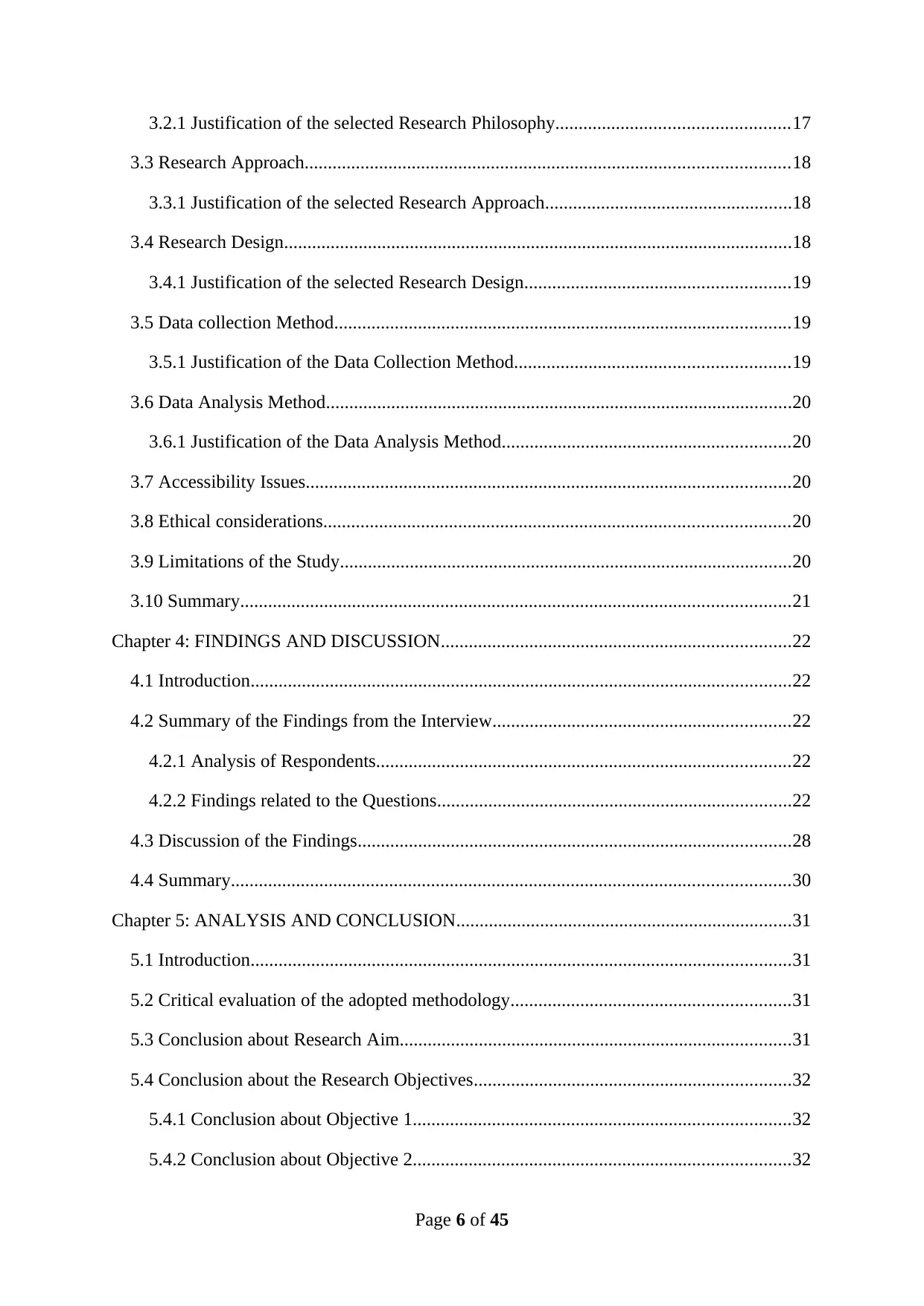
3.2.1 Justification of the selected Research Philosophy..................................................17
3.3 Research Approach........................................................................................................18
3.3.1 Justification of the selected Research Approach.....................................................18
3.4 Research Design.............................................................................................................18
3.4.1 Justification of the selected Research Design.........................................................19
3.5 Data collection Method..................................................................................................19
3.5.1 Justification of the Data Collection Method...........................................................19
3.6 Data Analysis Method....................................................................................................20
3.6.1 Justification of the Data Analysis Method..............................................................20
3.7 Accessibility Issues........................................................................................................20
3.8 Ethical considerations....................................................................................................20
3.9 Limitations of the Study.................................................................................................20
3.10 Summary......................................................................................................................21
Chapter 4: FINDINGS AND DISCUSSION...........................................................................22
4.1 Introduction....................................................................................................................22
4.2 Summary of the Findings from the Interview................................................................22
4.2.1 Analysis of Respondents.........................................................................................22
4.2.2 Findings related to the Questions............................................................................22
4.3 Discussion of the Findings.............................................................................................28
4.4 Summary........................................................................................................................30
Chapter 5: ANALYSIS AND CONCLUSION........................................................................31
5.1 Introduction....................................................................................................................31
5.2 Critical evaluation of the adopted methodology............................................................31
5.3 Conclusion about Research Aim....................................................................................31
5.4 Conclusion about the Research Objectives....................................................................32
5.4.1 Conclusion about Objective 1.................................................................................32
5.4.2 Conclusion about Objective 2.................................................................................32
Page 6 of 45
3.3 Research Approach........................................................................................................18
3.3.1 Justification of the selected Research Approach.....................................................18
3.4 Research Design.............................................................................................................18
3.4.1 Justification of the selected Research Design.........................................................19
3.5 Data collection Method..................................................................................................19
3.5.1 Justification of the Data Collection Method...........................................................19
3.6 Data Analysis Method....................................................................................................20
3.6.1 Justification of the Data Analysis Method..............................................................20
3.7 Accessibility Issues........................................................................................................20
3.8 Ethical considerations....................................................................................................20
3.9 Limitations of the Study.................................................................................................20
3.10 Summary......................................................................................................................21
Chapter 4: FINDINGS AND DISCUSSION...........................................................................22
4.1 Introduction....................................................................................................................22
4.2 Summary of the Findings from the Interview................................................................22
4.2.1 Analysis of Respondents.........................................................................................22
4.2.2 Findings related to the Questions............................................................................22
4.3 Discussion of the Findings.............................................................................................28
4.4 Summary........................................................................................................................30
Chapter 5: ANALYSIS AND CONCLUSION........................................................................31
5.1 Introduction....................................................................................................................31
5.2 Critical evaluation of the adopted methodology............................................................31
5.3 Conclusion about Research Aim....................................................................................31
5.4 Conclusion about the Research Objectives....................................................................32
5.4.1 Conclusion about Objective 1.................................................................................32
5.4.2 Conclusion about Objective 2.................................................................................32
Page 6 of 45
Paraphrase This Document
Need a fresh take? Get an instant paraphrase of this document with our AI Paraphraser
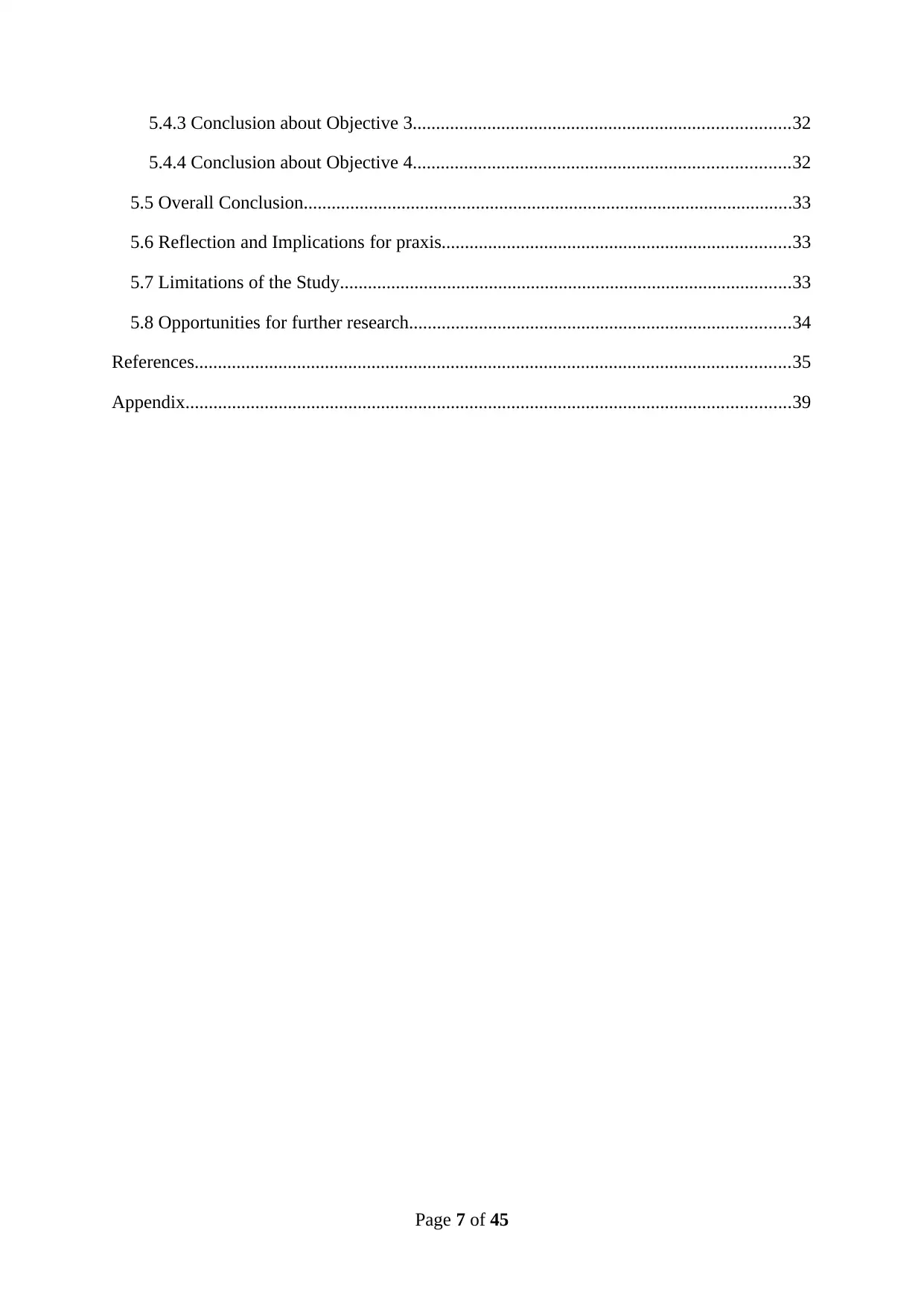
5.4.3 Conclusion about Objective 3.................................................................................32
5.4.4 Conclusion about Objective 4.................................................................................32
5.5 Overall Conclusion.........................................................................................................33
5.6 Reflection and Implications for praxis...........................................................................33
5.7 Limitations of the Study.................................................................................................33
5.8 Opportunities for further research..................................................................................34
References................................................................................................................................35
Appendix..................................................................................................................................39
Page 7 of 45
5.4.4 Conclusion about Objective 4.................................................................................32
5.5 Overall Conclusion.........................................................................................................33
5.6 Reflection and Implications for praxis...........................................................................33
5.7 Limitations of the Study.................................................................................................33
5.8 Opportunities for further research..................................................................................34
References................................................................................................................................35
Appendix..................................................................................................................................39
Page 7 of 45
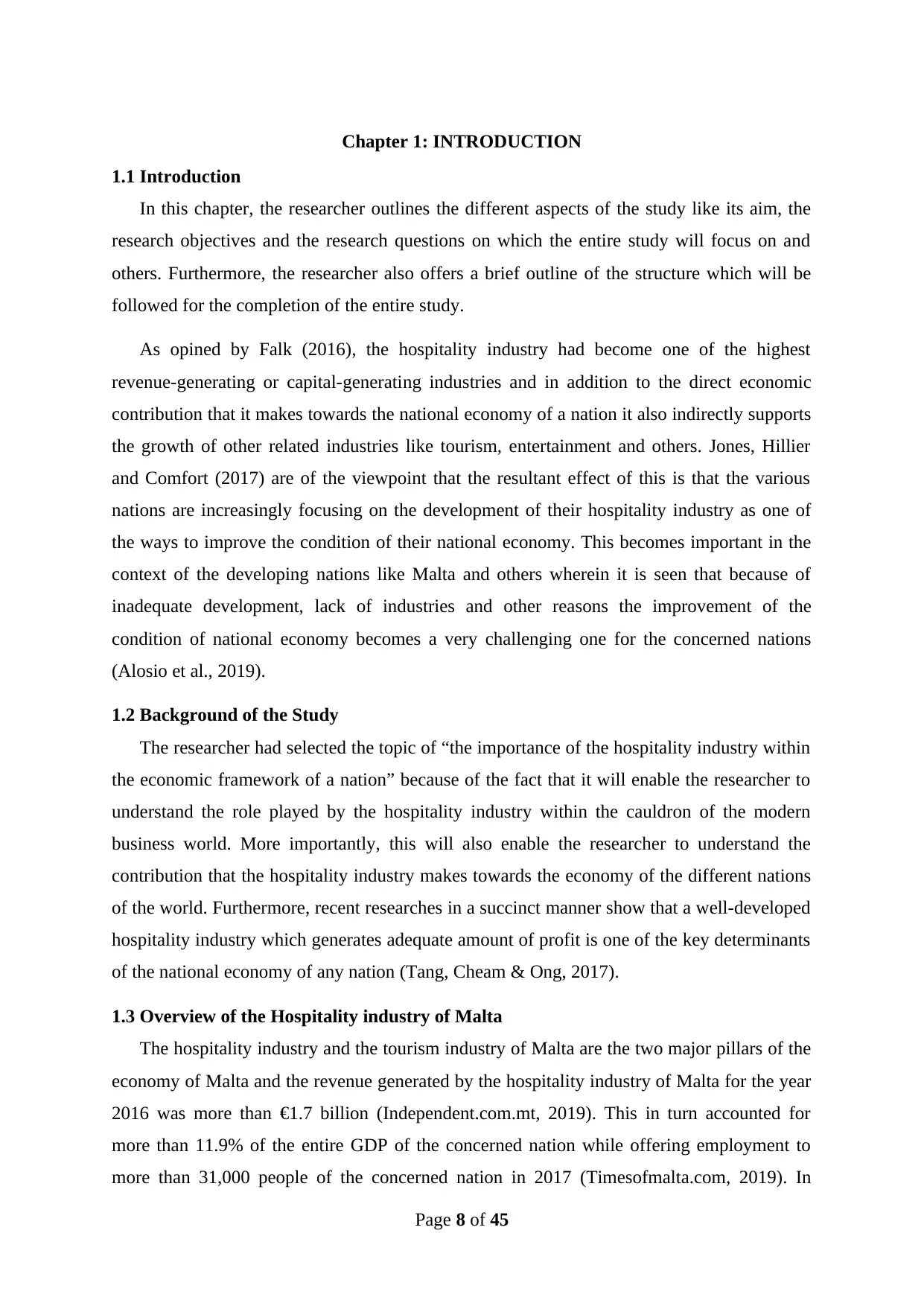
Chapter 1: INTRODUCTION
1.1 Introduction
In this chapter, the researcher outlines the different aspects of the study like its aim, the
research objectives and the research questions on which the entire study will focus on and
others. Furthermore, the researcher also offers a brief outline of the structure which will be
followed for the completion of the entire study.
As opined by Falk (2016), the hospitality industry had become one of the highest
revenue-generating or capital-generating industries and in addition to the direct economic
contribution that it makes towards the national economy of a nation it also indirectly supports
the growth of other related industries like tourism, entertainment and others. Jones, Hillier
and Comfort (2017) are of the viewpoint that the resultant effect of this is that the various
nations are increasingly focusing on the development of their hospitality industry as one of
the ways to improve the condition of their national economy. This becomes important in the
context of the developing nations like Malta and others wherein it is seen that because of
inadequate development, lack of industries and other reasons the improvement of the
condition of national economy becomes a very challenging one for the concerned nations
(Alosio et al., 2019).
1.2 Background of the Study
The researcher had selected the topic of “the importance of the hospitality industry within
the economic framework of a nation” because of the fact that it will enable the researcher to
understand the role played by the hospitality industry within the cauldron of the modern
business world. More importantly, this will also enable the researcher to understand the
contribution that the hospitality industry makes towards the economy of the different nations
of the world. Furthermore, recent researches in a succinct manner show that a well-developed
hospitality industry which generates adequate amount of profit is one of the key determinants
of the national economy of any nation (Tang, Cheam & Ong, 2017).
1.3 Overview of the Hospitality industry of Malta
The hospitality industry and the tourism industry of Malta are the two major pillars of the
economy of Malta and the revenue generated by the hospitality industry of Malta for the year
2016 was more than €1.7 billion (Independent.com.mt, 2019). This in turn accounted for
more than 11.9% of the entire GDP of the concerned nation while offering employment to
more than 31,000 people of the concerned nation in 2017 (Timesofmalta.com, 2019). In
Page 8 of 45
1.1 Introduction
In this chapter, the researcher outlines the different aspects of the study like its aim, the
research objectives and the research questions on which the entire study will focus on and
others. Furthermore, the researcher also offers a brief outline of the structure which will be
followed for the completion of the entire study.
As opined by Falk (2016), the hospitality industry had become one of the highest
revenue-generating or capital-generating industries and in addition to the direct economic
contribution that it makes towards the national economy of a nation it also indirectly supports
the growth of other related industries like tourism, entertainment and others. Jones, Hillier
and Comfort (2017) are of the viewpoint that the resultant effect of this is that the various
nations are increasingly focusing on the development of their hospitality industry as one of
the ways to improve the condition of their national economy. This becomes important in the
context of the developing nations like Malta and others wherein it is seen that because of
inadequate development, lack of industries and other reasons the improvement of the
condition of national economy becomes a very challenging one for the concerned nations
(Alosio et al., 2019).
1.2 Background of the Study
The researcher had selected the topic of “the importance of the hospitality industry within
the economic framework of a nation” because of the fact that it will enable the researcher to
understand the role played by the hospitality industry within the cauldron of the modern
business world. More importantly, this will also enable the researcher to understand the
contribution that the hospitality industry makes towards the economy of the different nations
of the world. Furthermore, recent researches in a succinct manner show that a well-developed
hospitality industry which generates adequate amount of profit is one of the key determinants
of the national economy of any nation (Tang, Cheam & Ong, 2017).
1.3 Overview of the Hospitality industry of Malta
The hospitality industry and the tourism industry of Malta are the two major pillars of the
economy of Malta and the revenue generated by the hospitality industry of Malta for the year
2016 was more than €1.7 billion (Independent.com.mt, 2019). This in turn accounted for
more than 11.9% of the entire GDP of the concerned nation while offering employment to
more than 31,000 people of the concerned nation in 2017 (Timesofmalta.com, 2019). In
Page 8 of 45
⊘ This is a preview!⊘
Do you want full access?
Subscribe today to unlock all pages.

Trusted by 1+ million students worldwide
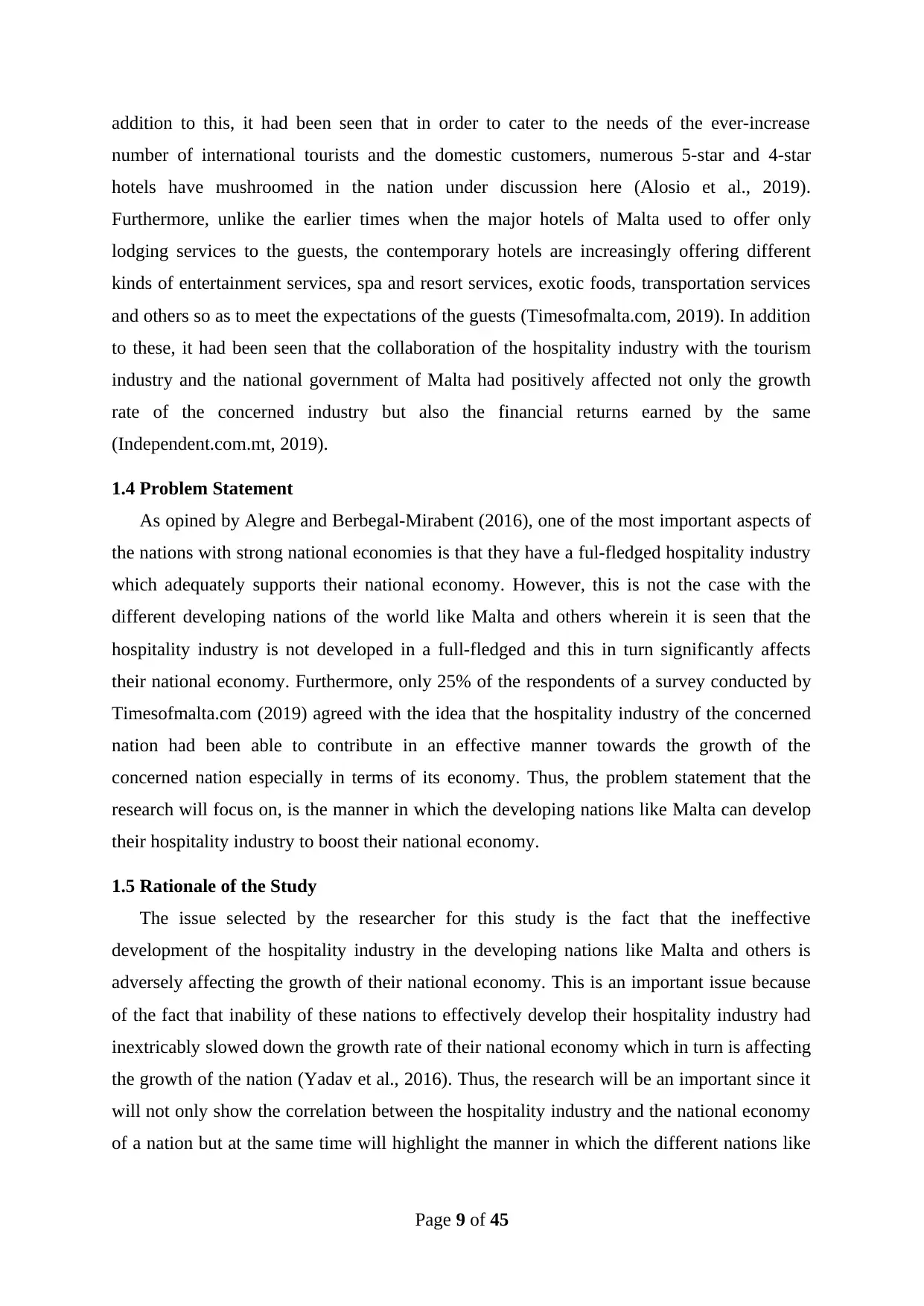
addition to this, it had been seen that in order to cater to the needs of the ever-increase
number of international tourists and the domestic customers, numerous 5-star and 4-star
hotels have mushroomed in the nation under discussion here (Alosio et al., 2019).
Furthermore, unlike the earlier times when the major hotels of Malta used to offer only
lodging services to the guests, the contemporary hotels are increasingly offering different
kinds of entertainment services, spa and resort services, exotic foods, transportation services
and others so as to meet the expectations of the guests (Timesofmalta.com, 2019). In addition
to these, it had been seen that the collaboration of the hospitality industry with the tourism
industry and the national government of Malta had positively affected not only the growth
rate of the concerned industry but also the financial returns earned by the same
(Independent.com.mt, 2019).
1.4 Problem Statement
As opined by Alegre and Berbegal-Mirabent (2016), one of the most important aspects of
the nations with strong national economies is that they have a ful-fledged hospitality industry
which adequately supports their national economy. However, this is not the case with the
different developing nations of the world like Malta and others wherein it is seen that the
hospitality industry is not developed in a full-fledged and this in turn significantly affects
their national economy. Furthermore, only 25% of the respondents of a survey conducted by
Timesofmalta.com (2019) agreed with the idea that the hospitality industry of the concerned
nation had been able to contribute in an effective manner towards the growth of the
concerned nation especially in terms of its economy. Thus, the problem statement that the
research will focus on, is the manner in which the developing nations like Malta can develop
their hospitality industry to boost their national economy.
1.5 Rationale of the Study
The issue selected by the researcher for this study is the fact that the ineffective
development of the hospitality industry in the developing nations like Malta and others is
adversely affecting the growth of their national economy. This is an important issue because
of the fact that inability of these nations to effectively develop their hospitality industry had
inextricably slowed down the growth rate of their national economy which in turn is affecting
the growth of the nation (Yadav et al., 2016). Thus, the research will be an important since it
will not only show the correlation between the hospitality industry and the national economy
of a nation but at the same time will highlight the manner in which the different nations like
Page 9 of 45
number of international tourists and the domestic customers, numerous 5-star and 4-star
hotels have mushroomed in the nation under discussion here (Alosio et al., 2019).
Furthermore, unlike the earlier times when the major hotels of Malta used to offer only
lodging services to the guests, the contemporary hotels are increasingly offering different
kinds of entertainment services, spa and resort services, exotic foods, transportation services
and others so as to meet the expectations of the guests (Timesofmalta.com, 2019). In addition
to these, it had been seen that the collaboration of the hospitality industry with the tourism
industry and the national government of Malta had positively affected not only the growth
rate of the concerned industry but also the financial returns earned by the same
(Independent.com.mt, 2019).
1.4 Problem Statement
As opined by Alegre and Berbegal-Mirabent (2016), one of the most important aspects of
the nations with strong national economies is that they have a ful-fledged hospitality industry
which adequately supports their national economy. However, this is not the case with the
different developing nations of the world like Malta and others wherein it is seen that the
hospitality industry is not developed in a full-fledged and this in turn significantly affects
their national economy. Furthermore, only 25% of the respondents of a survey conducted by
Timesofmalta.com (2019) agreed with the idea that the hospitality industry of the concerned
nation had been able to contribute in an effective manner towards the growth of the
concerned nation especially in terms of its economy. Thus, the problem statement that the
research will focus on, is the manner in which the developing nations like Malta can develop
their hospitality industry to boost their national economy.
1.5 Rationale of the Study
The issue selected by the researcher for this study is the fact that the ineffective
development of the hospitality industry in the developing nations like Malta and others is
adversely affecting the growth of their national economy. This is an important issue because
of the fact that inability of these nations to effectively develop their hospitality industry had
inextricably slowed down the growth rate of their national economy which in turn is affecting
the growth of the nation (Yadav et al., 2016). Thus, the research will be an important since it
will not only show the correlation between the hospitality industry and the national economy
of a nation but at the same time will highlight the manner in which the different nations like
Page 9 of 45
Paraphrase This Document
Need a fresh take? Get an instant paraphrase of this document with our AI Paraphraser
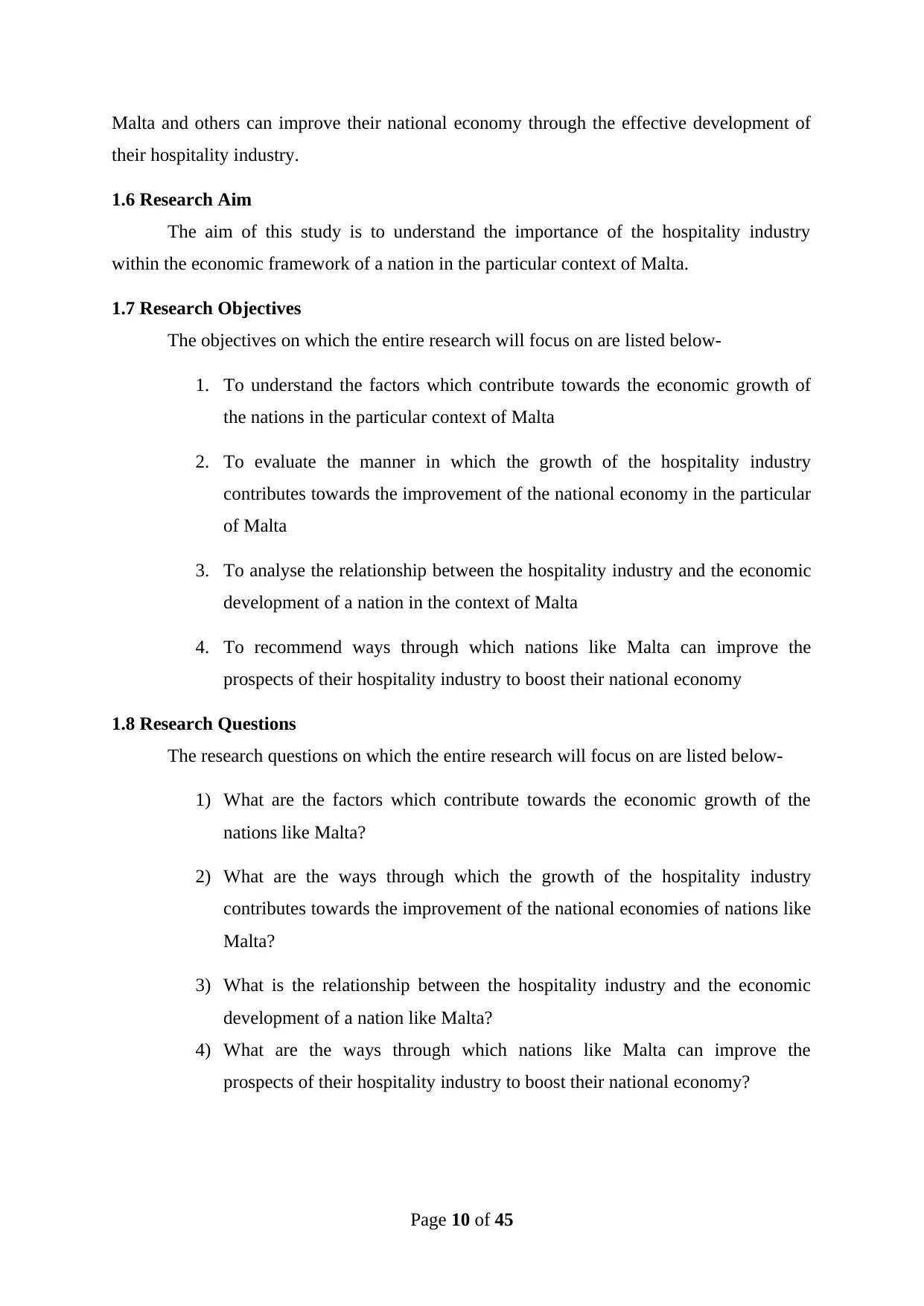
Malta and others can improve their national economy through the effective development of
their hospitality industry.
1.6 Research Aim
The aim of this study is to understand the importance of the hospitality industry
within the economic framework of a nation in the particular context of Malta.
1.7 Research Objectives
The objectives on which the entire research will focus on are listed below-
1. To understand the factors which contribute towards the economic growth of
the nations in the particular context of Malta
2. To evaluate the manner in which the growth of the hospitality industry
contributes towards the improvement of the national economy in the particular
of Malta
3. To analyse the relationship between the hospitality industry and the economic
development of a nation in the context of Malta
4. To recommend ways through which nations like Malta can improve the
prospects of their hospitality industry to boost their national economy
1.8 Research Questions
The research questions on which the entire research will focus on are listed below-
1) What are the factors which contribute towards the economic growth of the
nations like Malta?
2) What are the ways through which the growth of the hospitality industry
contributes towards the improvement of the national economies of nations like
Malta?
3) What is the relationship between the hospitality industry and the economic
development of a nation like Malta?
4) What are the ways through which nations like Malta can improve the
prospects of their hospitality industry to boost their national economy?
Page 10 of 45
their hospitality industry.
1.6 Research Aim
The aim of this study is to understand the importance of the hospitality industry
within the economic framework of a nation in the particular context of Malta.
1.7 Research Objectives
The objectives on which the entire research will focus on are listed below-
1. To understand the factors which contribute towards the economic growth of
the nations in the particular context of Malta
2. To evaluate the manner in which the growth of the hospitality industry
contributes towards the improvement of the national economy in the particular
of Malta
3. To analyse the relationship between the hospitality industry and the economic
development of a nation in the context of Malta
4. To recommend ways through which nations like Malta can improve the
prospects of their hospitality industry to boost their national economy
1.8 Research Questions
The research questions on which the entire research will focus on are listed below-
1) What are the factors which contribute towards the economic growth of the
nations like Malta?
2) What are the ways through which the growth of the hospitality industry
contributes towards the improvement of the national economies of nations like
Malta?
3) What is the relationship between the hospitality industry and the economic
development of a nation like Malta?
4) What are the ways through which nations like Malta can improve the
prospects of their hospitality industry to boost their national economy?
Page 10 of 45
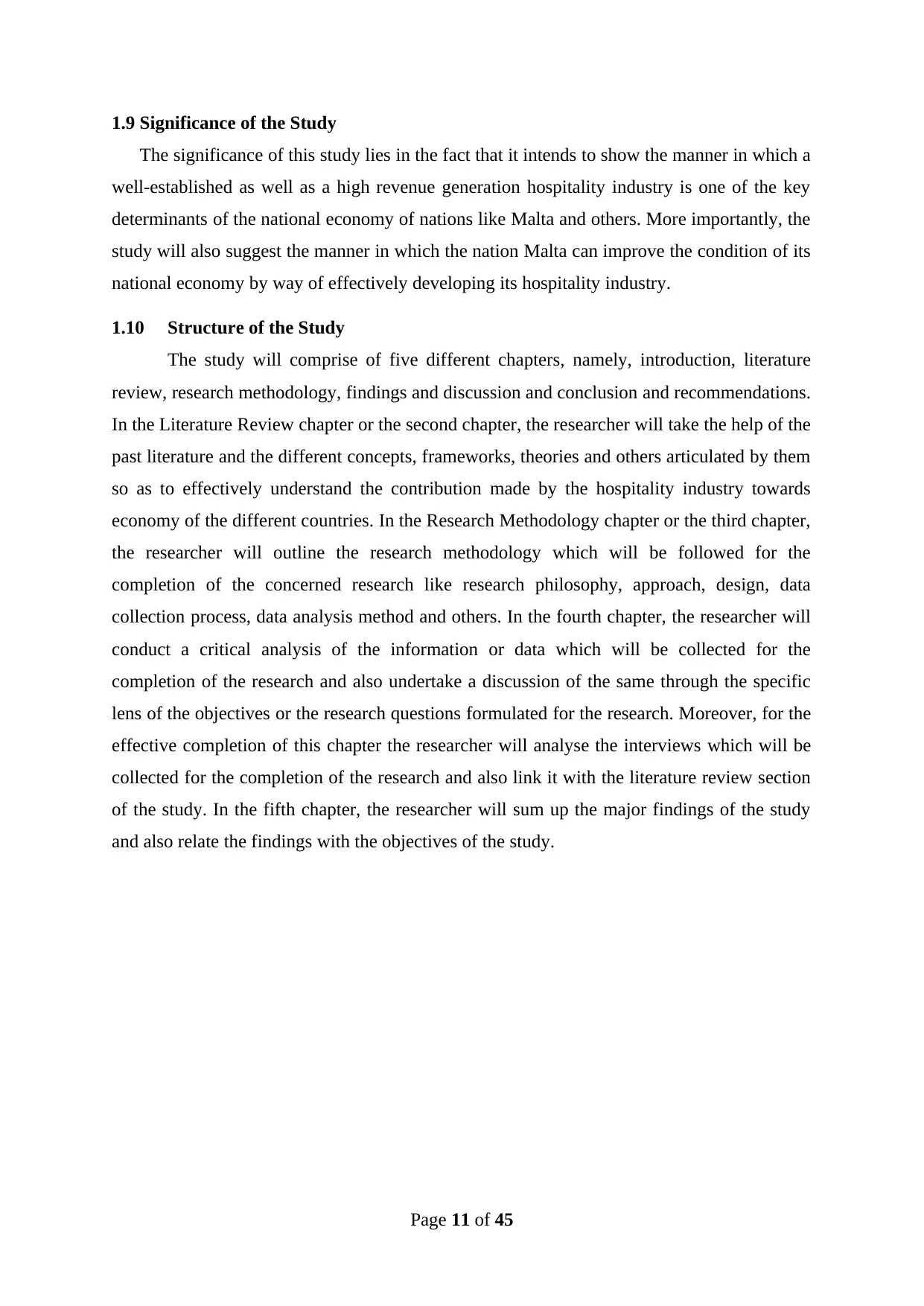
1.9 Significance of the Study
The significance of this study lies in the fact that it intends to show the manner in which a
well-established as well as a high revenue generation hospitality industry is one of the key
determinants of the national economy of nations like Malta and others. More importantly, the
study will also suggest the manner in which the nation Malta can improve the condition of its
national economy by way of effectively developing its hospitality industry.
1.10 Structure of the Study
The study will comprise of five different chapters, namely, introduction, literature
review, research methodology, findings and discussion and conclusion and recommendations.
In the Literature Review chapter or the second chapter, the researcher will take the help of the
past literature and the different concepts, frameworks, theories and others articulated by them
so as to effectively understand the contribution made by the hospitality industry towards
economy of the different countries. In the Research Methodology chapter or the third chapter,
the researcher will outline the research methodology which will be followed for the
completion of the concerned research like research philosophy, approach, design, data
collection process, data analysis method and others. In the fourth chapter, the researcher will
conduct a critical analysis of the information or data which will be collected for the
completion of the research and also undertake a discussion of the same through the specific
lens of the objectives or the research questions formulated for the research. Moreover, for the
effective completion of this chapter the researcher will analyse the interviews which will be
collected for the completion of the research and also link it with the literature review section
of the study. In the fifth chapter, the researcher will sum up the major findings of the study
and also relate the findings with the objectives of the study.
Page 11 of 45
The significance of this study lies in the fact that it intends to show the manner in which a
well-established as well as a high revenue generation hospitality industry is one of the key
determinants of the national economy of nations like Malta and others. More importantly, the
study will also suggest the manner in which the nation Malta can improve the condition of its
national economy by way of effectively developing its hospitality industry.
1.10 Structure of the Study
The study will comprise of five different chapters, namely, introduction, literature
review, research methodology, findings and discussion and conclusion and recommendations.
In the Literature Review chapter or the second chapter, the researcher will take the help of the
past literature and the different concepts, frameworks, theories and others articulated by them
so as to effectively understand the contribution made by the hospitality industry towards
economy of the different countries. In the Research Methodology chapter or the third chapter,
the researcher will outline the research methodology which will be followed for the
completion of the concerned research like research philosophy, approach, design, data
collection process, data analysis method and others. In the fourth chapter, the researcher will
conduct a critical analysis of the information or data which will be collected for the
completion of the research and also undertake a discussion of the same through the specific
lens of the objectives or the research questions formulated for the research. Moreover, for the
effective completion of this chapter the researcher will analyse the interviews which will be
collected for the completion of the research and also link it with the literature review section
of the study. In the fifth chapter, the researcher will sum up the major findings of the study
and also relate the findings with the objectives of the study.
Page 11 of 45
⊘ This is a preview!⊘
Do you want full access?
Subscribe today to unlock all pages.

Trusted by 1+ million students worldwide
1 out of 44
Related Documents
Your All-in-One AI-Powered Toolkit for Academic Success.
+13062052269
info@desklib.com
Available 24*7 on WhatsApp / Email
![[object Object]](/_next/static/media/star-bottom.7253800d.svg)
Unlock your academic potential
Copyright © 2020–2026 A2Z Services. All Rights Reserved. Developed and managed by ZUCOL.





